This isn’t a story about me, but rather something awesome that I witnessed while working at a big fire on Saturday. It was an interaction that made my night, even my week, but first I have to set the scene, and allow for a side trip to tell you the Moose Story at the end. You’ll see why it relates….
I was installing two-way radio equipment in my new car with help from a buddy, Kaia, when our pagers both went off. (Kaia’s a volunteer with our local fire department): “Structure fire,” Dispatch said, at the “old clubhouse” — a large building that used to serve as the clubhouse for the local golf course. It has been mostly vacant for years. “Multiple callers say the building is fully engulfed.” — not just maybe some smoke, but fire clearly visible.
“I’ve gotta go!” Kaia said. The building is about 7 minutes south of my house. Kit was home but busy, so I leaned in the door to tell her what was up, and that we’d miss dinner. It was 6:15 p.m. and fully dark.
Dispatch already had the fire department in Montrose, the “big city” to the north, on the way to help, and asked the local Fire Captain who acknowledged the call if he wanted the department from the south, Ridgway, to respond too. Yes, he responded; he knew that building, and knew a fire there would need lots of manpower.
Our EMS protocol is to have an ambulance standing by on structure fires since such firefighting can be pretty dangerous, but Montrose usually brings their own when they respond up here, so our agency doesn’t send one unless asked. But it can take them a half-hour to get to that area, so I headed out behind Kaia so there would be a medic right there if something happened in the meantime.
The Scene
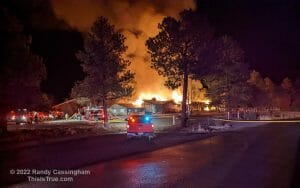
It was indeed fully involved, I said on the radio as I turned the corner. Lots of cars had stopped, and neighbors were milling around, worried about fire spreading into the neighborhood: last December’s fire storm in the Boulder area is still pretty fresh in everyone’s mind, when a thousand homes were destroyed in just a few hours. It’s now clear that things can go from “Ooh, a fire!” to “Oh, crap!” pretty quickly, even in a city — and this heavily forested area is no city.
As Kaia and I were waiting for the firetrucks to arrive, I noticed the cable stretched across the building’s driveway. “Let’s see if we can get this open,” I said. On one end: a heavy-duty padlock. On the other end: the same. Then I noticed a loop in the middle: there were two cables joined there. “Is that a carabineer?” I said. Nope! Another freaking heavy-duty padlock! One of the neighbors called out four digits, and I looked closely at the lock: a combination lock.
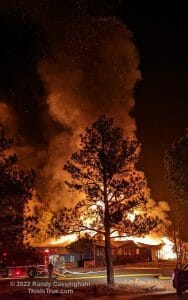
Sweet … but the combo didn’t work. We were still at the middle, so we moved to one of the ends. That one wasn’t working either, but by then a firetruck pulled up and Kaia pointed out the problem. A burly firefighter arrived with the “universal key” — a bolt cutter — and made quick work of the lock at the end. I grabbed the loose cable and ran to the other side dragging it, and pulled it to a place where it wouldn’t be in anyone’s way.
The fire department set up, pulling a 5-inch hose from a nearby hydrant into the driveway we just got open, which means the road is now closed. It’s a busy road: the main access to hundreds of homes, though there’s also a back way in. I turned my car around so my emergency lights were extra-visible, and set up between that driveway and the corner to help ensure fire vehicles could get in (I knew there were plenty coming!), and civilians wouldn’t. All in all, cars knew to stay out, and how to get to the back access if they needed to go home.
Logistics
Not needed as a medic, at least for the time being, I just lent a hand wherever needed, not including actual firefighting since as someone who isn’t trained, I’d just be in the way. Simple logistics.
A sheriff’s deputy arrived pretty shortly after I did, and I filled him in with what I saw on arrival. He was thinking aloud, and said he needed to notify the undersheriff. Another fire department Captain arrived, and she jumped into the back of her pickup to don her turnout gear; I held a flashlight so she could see her stuff. “You’re the guy who fixed my radio last month, right?” she said. “That was me,” I confirmed.
I heard Command — every big incident needs a Commander — ask Dispatch if the power and gas companies had been called. Yes, but “no ETA.” They’re usually on the spot pretty quickly, but it’s a holiday weekend. They did eventually arrive, and I notified the Commander on the radio so Dispatch would hear it and note the time in the log.
Once everyone was there and the crews had settled into a good defensive posture, I walked over to talk to the Commander. I know him well: he’s the long-standing chief of the volunteer fire department that covers our house, and a Captain in Montrose. “John?” I asked. “Did your department send an ambulance?” He quickly whipped around to look. “Um, I guess not,” he said. “I highly recommend we get one here,” I said. He asked if I could have one of ours respond, so I got on the radio and asked Dispatch to send one up from Ridgway, and then made sure there was a path in the road for them to get close enough.
After about 5 minutes I checked on the ambulance. They were on the way, but apparently there was someone going slow in front of them — they don’t respond with lights and siren to a standby.
My timing was excellent: about 10 minutes later the Commander called me on the radio. “Move in,” he said. “I have a patient for you on the B side.” I started walking to the scene when I heard the ambulance on the radio say “We’re here.” I turned around and was startled that he had crept in right behind me when I wasn’t looking! I stopped, pointed out where he needed to go, pointed out the Commander, and then saw a little car pass the ambulance on the right, headed down the closed road. It was the same car that delayed the ambulance.
I lit up the car with my very bright LED flashlight just as he drove over the 5-inch hose supplying the entire firefight.
“STOP THAT CAR!” I yelled, and a sheriff’s deputy turned on his heel and ran after the car. That’s probably the first time he chased someone down to pull them over on foot! Another deputy arrived and blocked the road better — it was the undersheriff. I went over and briefed her about what was going on, and then went over to the ambulance.
The Best Thing All Week
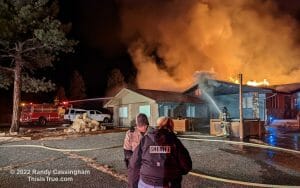
“The patient” was fine — no treatment or transport needed. I found the medic, Greg, an old friend who is retired from the U.S. Navy, chatting with one of the firefighters who was taking a break. Greg told the firefighter that he used to volunteer with his department a few years ago, so he knew the firefighter was at least somewhat of a “newbie” since he didn’t know him.
The firefighter introduced himself and Greg said something simple to him: “Thank you for your service.” It was the best thing I heard all week.
I absolutely agree that First Responders are serving their country. Especially the volunteers: most firefighters in the U.S. are volunteers, as are quite a few of the medics, and even a fair number of cops. They are absolutely serving their fellow humans.
There has definitely been a trend of people telling me “Thank you for your service,” so I know it’s an expanding idea. But if you haven’t thought about that, maybe you can think about it now. I mean, not to me, but to the firefighters, medics, and cops you interact with, especially when they’re volunteers.
With the ambulance on scene, I got to go home, and get some hot leftovers in. The last of the firefighters didn’t get to go home until 3:00 a.m., and one of the deputies stayed all night. And through it all, Dispatch was cool and collected: they are First Responders too.
It’s all Service.
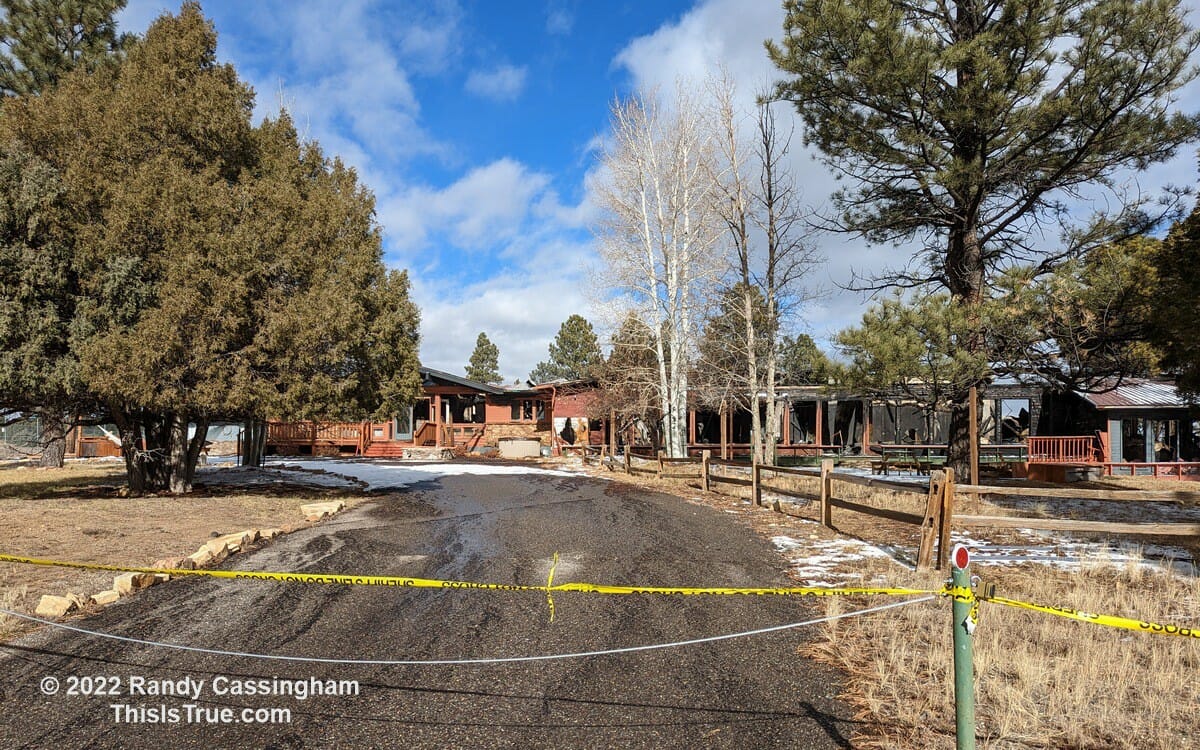
So… the Moose Story!
This week’s newsletter brings another example of First Responders really going all out:
Watch Your Step
“I was like, ‘Oh my gosh, I really want to be there for this because there’s no way anybody’s gonna believe this’,” said Kenai Peninsula (Alaska) firefighter Gunnar Romatz when he heard a rescue call dispatched to Soldotna. An animal had fallen into a home’s window well, smashed through the window, and ended up dazed in the basement. Not just any animal: a moose. Seven firefighters, three Fish and Game biologists, and two wildlife troopers responded. A biologist sedated the animal, and then the dozen humans rolled it onto a “people mover” tarp and hauled it upstairs and outside — “Luckily, it wasn’t a full-grown moose,” Romatz said. A biologist treated the moose’s minor mangling from the fall, finishing with an antidote to the sedative so it could amble off. But not before they got a photo, of course. “It’s not as rare as you think that the moose makes it inside of a home,” said Wildlife Trooper Joseph Morris. In fact, it’s the second time that a moose fell into that very home’s window well. (RC/Anchorage Daily News) …It’s a great time for a grate.
After finishing writing that story, I spotted some more quotes from Romatz that I hadn’t noticed, but figured the story was long enough. But there’s space here!
As they were carrying the moose on the tarp up the stairs and through the home’s hallway, he said, “this moose is just picking its head up, and you’re two inches away from this moose, you know? So we’re like, ‘How are you?’ And it just kind of looked at us, ‘Haven’t been in this situation before, you know.’ Us either!”
Here’s the photo:
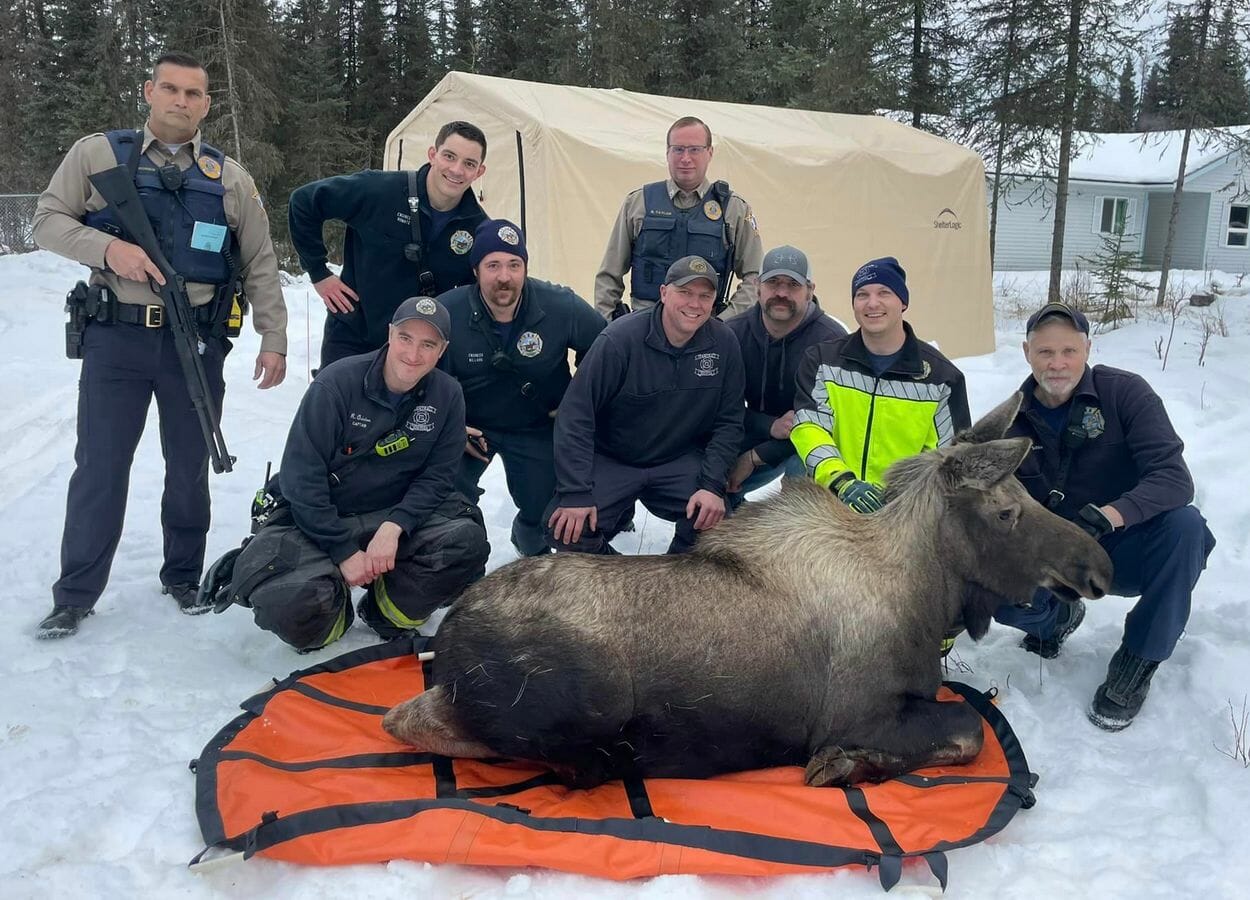
Once given the antidote (and I couldn’t help to notice in the photo one of the troopers is holding a shotgun, “just in case”), they gave the moose some space so as to not spook it. They noticed the moose was able to trot away without limping — but headed toward the same broken window!
“They were like, ‘Oh, no, no, no, no, no, no!’ But it just ran off back into the tree line,” Romatz said. “We got a video of it, and it was happy, healthy — and a job well done, apparently.”
Well done for sure, and another great example of service, both to humanity (especially the homeowners) and nature.
2023 Update
The fire was investigated not only by the Ouray County Sheriff’s office, but also the Colorado Bureau of Investigation …and a private investigator hired by the structure’s insurance company. It took several months, but they all came to the same conclusion: the fire was accidental, starting in the heater for a decommissioned indoor swimming pool.
– – –
Bad link? Broken image? Other problem on this page? Use the Help button lower right, and thanks.
This page is an example of my style of “Thought-Provoking Entertainment”. This is True is an email newsletter that uses “weird news” as a vehicle to explore the human condition in an entertaining way. If that sounds good, click here to open a subscribe form.
To really support This is True, you’re invited to sign up for a subscription to the much-expanded “Premium” edition:
Q: Why would I want to pay more than the minimum rate?
A: To support the publication to help it thrive and stay online: this kind of support means less future need for price increases (and smaller increases when they do happen), which enables more people to upgrade. This option was requested by existing Premium subscribers.

Being acquainted with the area, I know well you folks dodged a possible disaster with that fire. Even with the recent moisture, I doubt the plants & trees have recovered from drought conditions. But inquiring minds want to know: did you find out what was up with the slow obliviot? I hope they get fined. I can’t imagine a good excuse for their behavior.
—
Since I was busy with other things, I never did see what happened with him. I was just grateful that there was “a cop around when you need one”! -rc
A very good story. Thank you for writing it. Also thank you for “Dispatch was cool and collected: they are First Responders too.” That is our job and yes we are the very first responders for when you dial 9-1-1. That’s one of us. THEN come the firefighters, EMS and Police.
I saw several articles around Veteran’s Day that said, “Thank you for your service,” is an offensive phrase. Yeah, we aren’t even suppose to thank people now. The level of “I’m offended” is getting out of hand. I’m glad to see you still appreciate the phrase. And apparently the firefighter appreciated it as well.
—
I’ve never seen a veteran be offended by being told that, with the one exception that you shouldn’t say it to them on Memorial Day, since that day is about the fallen, not the living. -rc
I’m a “disabled” (I am NOT! I just have injuries that are never going to heal. I still walk, talk and function at a high level!) with 18+ years of Active Duty, and 36+ years of inactive duty (called a “medical retirement.”) I am NOT “offended” by someone thanking me for serving, I’m just at a stumbling loss for words trying to respond to them. I say “thank you,” and leave it at that, but always want to say something more, to make my thanks more personal.
Just a thought for those of you (civilians) who thank us, and wonder at the quiet response you get. I think that some, maybe many, Veterans are at a loss in trying to respond.
Randy, as you know, I’ve played for both “teams,” military and EMS, and there is not an occasion that I allow to pass where I don’t, at the least, tell a bus crew my thanks for their response. Just had to call a bus for a down person (my daughter! undetermined as to the cause) this past Saturday. Volunteers and pretty danged sharp at what they did. So, my chance to give a shout out to the Hopkinsville KY Volunteer EMS and the two EMT’s riding that bus! “Thanks you two!”
—
For other readers: lots of medics call an ambulance a “bus,” but not all. I tend to use “rig,” some use “unit,” and I’m sure there are plenty of others. (Patients might ride on a “pram” or a “gurney” or other too.) Anyway, Guy, I think another reason for silence is the phrase can take them back to their service days. Hopefully they remember the good stuff, and not the bad, since no matter how they serve, there is both. I hope your daughter is OK. -rc
I’m a Vietnam vet — only in for less than two years — but it was many, many years before I started wearing my Army-Vietnam Veteran cap. Didn’t want to get spit on, much less thanked for my service.
But I finally found a good response that someone had suggested: “Thank you for your support.”
And I certainly have never been offended by being offered thanks.
I regularly wear my ship’s hat now that she has been decommissioned and stricken. The only time I feel ‘Thank you for your service’ is offensive is when it comes from someone wearing one of those iconic red hats. I say ‘Thank you’ to everyone except those traitors, they get a happy ‘Eff you.’
Amen, brother.
Please follow up with the cop and tell us all exactly what happened to the obliviot. He certainly deserves the book thrown at him.
—
I will likely never know, and even if I find out it would be unethical to give details in public. Sorry. Just imagine that he was arrested and had to wait until Monday to post bail, since that sounds like the most satisfying scenario! 🙂 (No, I did not actually witness any arrest or other actions.) -rc
Great stories Randy!
Great story! Gives me, who had not the slightest idea of how your various services work, a good idea of how they work! Quite impressive.
I was an Army combat medic, worked ambulances while I was in college, and had a 26-year career as Information Officer for the California Highway Patrol. Great stories (both the fire and the moose)! And thank you for your service, sir!
—
Thank you for yours, x3. -rc
Let’s hope your ambulance blocker gets what this idiot got, at least.
—
8 months in prison …but suspended. OTOH, plus 20 rehabilitation activity days (whatever that is), 200 hours of community service, £600 [US$740] in costs, and banned from driving for three years. Pretty stiff — and rightly so. I will clarify, though, that “our” idiot wasn’t doing it on purpose as the ambulance in our case was not under lights and siren. Entering the scene and driving over the firefighters’ only water source? On purpose. -rc
Whenever I am near a fire station and there are people out working, or I see them getting groceries, I do my best to stop and tell them “Thank you.” When I get a chance to stop and converse with any law enforcement personnel, I do the same thing. Then I make sure to give them a GOOHF card. Like I did with 3 Marine Resources Officers this week. I love the smiles.
—
I was with someone last night who was feeling a bit down, so I handed him a card. As soon as he read the front he blurted out, “EVERYONE needs one of these!” — so I gave him a pack of 50 so he could experience how good it feels to give them out. -rc
While I agree that “Thank you for your service” definitely is appropriate, and should not be censored, I have encountered people on- and offline (especially the redcap brigade) who think TYFYS is the be-all and end-all of support for veterans, and have no qualms of saying “TYFYS — but no, you’re not getting medical treatment in the VA hospital because you cannot prove the constant pain that enemy bullet lodged into your spine causes is debilitating — and that you didn’t catch it during your youth in Lowdown Alley.” In other words, people who think that saying the phrase absolves them from taking positive *actions* or, worse yet, pay money. If you’ve encountered enough of these people, and maybe even lost friends due to VA refusing housing support to veterans, you start second-guessing people who use the phrase and do not seem to mean it.